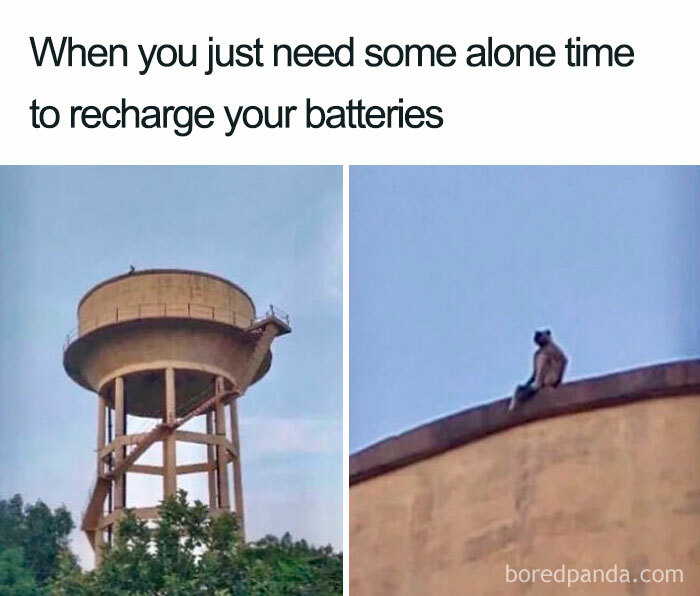Funny Memes When Ur Shy Talking to Ur Oppa
Introverts and extroverts see the world very differently, but they're both loveable in their own unique ways. However, being an introvert isn't easy, as these memes, collected by our people-and-cat-loving Bored Panda team, will show you. Remember to upvote the ones that you related to the most as you scroll down and be sure to check our our earlier post about introvert memes right here.
However, the world of introversion and extroversion is much more complex than it would first seem. Real introverts and extroverts are far rarer than we think; extroversion is actually a spectrum, not binary; and the vast majority of us are actually ambiverts, falling somewhere in the middle.
Bored Panda previously spoke about the myths surrounding introversion with Dr. Andrew Spark from the Queensland University of Technology. Dr. Spark, who has researched the link between introversion and leadership, explained to us that introverts think about social interaction differently from extroverts and this may impact their career paths and positions.
"My research on introversion and leadership focuses on how introverts and extroverts think and feel about the behaviors required of leaders in leadership situations. Leadership roles typically require one to act in ways that are generally better suited to extroverts (e.g., to be assertive, social, bold, etc.)," Dr. Spark from the Queensland University of Technology told Bored Panda. "For many decades, we have known that extroverts tend to perform better in leadership roles and are selected into leadership roles more often, however, more recent scientific work has been exploring how and why this happens," Dr. Spark said.
"In my own work, my colleagues and I found that one of the reasons introverts are not seen to be as 'leaderlike' by others is because they think that leadership situations are going to be unpleasant. The technical name for this is 'affective forecasting.' Affective forecasting refers to the expectation we have of our future emotions, which is to say that we make a prediction about how we will feel in a future situation." Dr. Spark continued: "Introverts are known to underpredict how good they will feel in future social interactions if they forecast themselves acting extroverted (because, perhaps surprisingly, acting extroverted is actually quite enjoyable, even for introverts). Given leadership situations require extroverted behavior, we expected that introverts' propensity to forecast more negative affect would probably help to explain why they do not rise into leadership positions as much as extroverts. This is indeed what we found."
The main question right now is whether or not we can change how introverts think about social interaction. That way, they might stand a better chance of rising to leadership positions. In fact, according to Dr. Spark, sometimes introverts can be much more effective than extroverts in those positions.
Dr. Spark pointed out that introverts are by no means common. "Because extroversion is a continuum, most people actually fall somewhere around the middle of the continuum. These people are sometimes called 'ambiverts,'" he said.
"Also, there is no official cut-off on someone's score before they are said to be an extrovert or an introvert, however, as a very rough rule of thumb (assuming you really want to divide people up into categories) it would not be unreasonable to say that 15-20% of the population are noticeably extroverted and 15-20% of the population are noticeably introverted. The remaining 60-70% of the population are probably more difficult to pigeon hole and hence may be better thought of as ambiverts."
What's more, Dr. Spark drew attention to another myth surrounding introverts and how they supposedly can't be extroverted. "A large body of evidence shows that introverted people actually engage in quite a number of extroverted behaviors in their daily lives as the specific situation demands, despite having a preference to be quiet and reserved. Equally, extroverted people engage in quite a number of introverted behaviors in their daily lives. That said, it is interesting that extroverted people have been shown to sometimes struggle when having to act introverted."
According to Dr. Spark, the research on whether or not introverts need to recharge more after socially interacting with others is mixed. "For example, in this study, scientists found that both introverts and extroverts experienced mental depletion after interacting with others and that this depletion occurred approximately 3 hours after the interaction It didn't make any difference if the person was introverted or extroverted," he shared.
"Then again, this study found that introverts experience slightly more negative emotion, tiredness and more feelings of inauthenticity when acting extroverted, despite also experiencing more positive emotion (note that positive and negative emotion are actually different processes rather than being polar opposites, so it is possible to be high on both). The jury is still out on this issue, which might come as a surprise to many!"
Dr. Spark added: "A lot more research needs to be done to understand how and why introverts think differently and whether we can uncover ways to encourage introverts into leadership positions given that they are quite capable of effective leadership in certain situations."
What about you, dear Pandas? Which side of the introversion/extroversion fence do you find yourself most often on? Which of the memes in this list did you relate to the most? Has the global pandemic turned you into more of an introvert? Share your thoughts and feelings in the comments below.
Note: this post originally had 115 images. It's been shortened to the top 50 images based on user votes.
Source: https://www.boredpanda.com/hilarious-introvert-memes/

0 Response to "Funny Memes When Ur Shy Talking to Ur Oppa"
Post a Comment